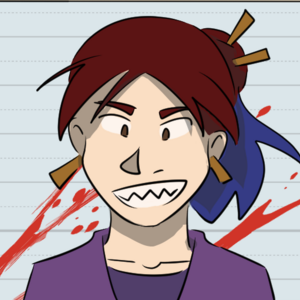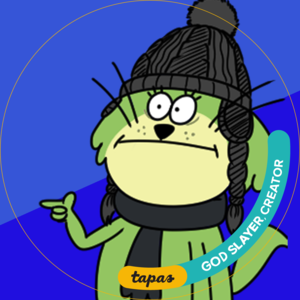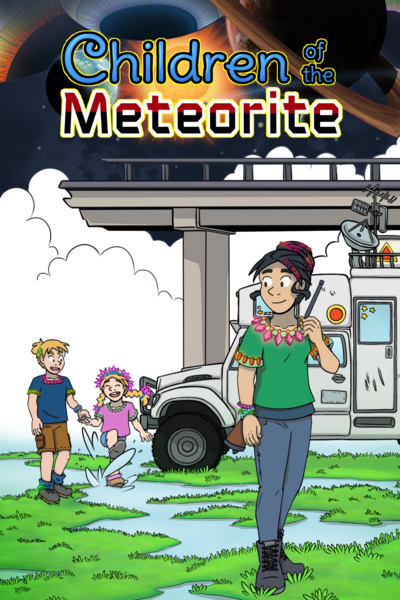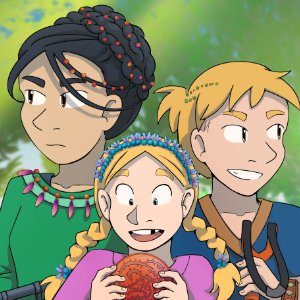At the far end of the hallway of the paintings, in the direction of the keep, a metallic door creaked open. A man who seemed to be in his early sixties stepped out, holding a crutch in his left hand. He had short gray hair with a receding hairline, and wore a suit but no tie, which was about as formal as most people would dress these days.
“I’m sorry, I was told to go upstairs but didn’t know where to go,” Rosario apologized and walked swiftly towards him. He also took some steps in her direction, and the door closed slowly behind him after he let it go. “I’m Rosario González, a crystal hunter. I’m here to see the mayor.”
“You found him,” announced the man, with a businesslike smile and a calm voice. “I’m William Cornwell, mayor of Spiez. Feel free to call me Bill.”
“Thanks. I was supposed to be here with two crystalsmiths, but the guard told me they arrived before me.”
“That’s correct. They arrived some fifteen minutes ago, and the young man at the gate let them in. We were just looking at the town from the keep. Mr. Grimm had some doubts about the town’s security, so I figured a 360-degree view from the tower would help him get a better appreciation of our defense system.” While she didn’t know Noah’s last name, Rosario was sure it had to be him. “Let’s join them, and we can talk in more detail about this swarm you discovered.” He turned towards the door that led to the keep, and Rosario followed.
They entered a square room, which was packed with medieval objects: sculptures, paintings, pieces of armor and clothing, trinkets, and household items of all sorts. They were all neatly placed on shelves and display cases and seemed to be dusted regularly, but still filled every available space in the room, except for a path that led to a staircase at the opposite end. Rosario fell behind, distracted by the sight.
“Here is where we brought most of the historical artifacts,” explained the mayor. “You see, the castle used to be a museum, but after it was reconverted to a government building, we realized it would be a shame if these valuable items became lost or ended up improperly stored, so we saved them here.”
“This is amazing,” admitted Rosario. “My apprentices would love to visit.”
“It is good to know the younger generation shows interest in history,” he nodded before continuing his way towards the wooden staircase.
Rosario took a step forward but didn’t feel the floor. For a split second, she thought perhaps the old wooden planks were uneven, but immediately realized it wasn’t the case. The last she saw before falling through a trapdoor and into complete darkness was Bill Cornwell, standing on the staircase, with a stern expression on his face.
*****
At the market near the docks, Stefan and Franziska munched on a bag of strawberries they had just bought from a street vendor. Both liked strawberries, but it was already late in the season, so managing to get their hands on some felt like the finest treat.
“Look! A bookstore!”
“Ah, come on, not again. You already bought books yesterday, and you only looked at the pictures.”
“Because I’m looking for something, and it wasn’t in those books,” she didn’t wait for an answer and walked towards the shop.
“What about all the books you have in the camper?” “I told you I’m looking for something, and it’s not in any of those books!” “How do you know?” “If I had seen it, I would remember,” she said before disappearing inside the store.
Out of options, Stefan followed.
The place looked old and smelled of even older paper; books piled up on every available surface, including a counter behind which they heard a voice.
“Welcome! Can I help you find something?” said a short and chubby man as he emerged from behind the counter. “The children’s section is over there, and all the paperback adventure books are on sale this week.”
“Thanks, but no. My sister is looking for books about monster plants. The more technical, the better.”
“Ah, a young scholar! I can offer you this compendium here; it’s an annotated version of Wenzel’s Introduction to Botany. I also have the extended version of Künzle’s medicinal plant guide, updated to include 74 species of monster plants. And if I may offer you something more local, this is a field manual of only behemoth and monster vegetation of the Highland.”
Franzi took the books and started going through them, with a serious expression on her face. Stefan eyed the field manual the seller had shown her last.
“That looks like some cheap photocopy.”
“Well, excuse us for not having a printer in this town. This book is produced one hundred percent locally, and photocopies are as fancy as we can get.” He shrugged and added, “Not like another type of technology would work here, anyway.”
“Was it written by someone from around here?”
“It was! My own stepfather, to be exact. He was resistant to crystals and loved going out to the mountains, so he made records of most of the species he found during his travels.”
Franziska looked up from the book she was studying. “Is he still here?”
“Unfortunately, no, he passed away five years ago.”
“Was it monsters?”
“No. Heart complications, likely from extended exposure to crystals.”
Stefan looked away, pretending to be interested in another book; what the seller described could be the fate waiting for many crystal hunters and smiths, or for any person who decided to expose themselves to crystals. After all, one was only as resistant as the crystals one could survive, and cumulative damage wasn’t easy to notice.
Franziska left the first two books on a shelf and approached the desk, where she placed the exact amount of money written on the photocopied book.
“I’d like to buy your stepdad’s book.”
After some last words, the siblings left the store and continued their walk down the street and towards the docks. Franziska looked serious as she went with the book in her arms. Stefan was starting to suspect there was more to his sister’s curiosity than just wanting to play post-Collapse botanist.
“Hey Franzi, why don’t we get something to eat and then sit down so you can read your book?” As he finished speaking, he noticed his sister was not by his side anymore.
He saw her across the street, staring at the window of a chocolate store so close her nose left a mark on the glass. Stefan approached with the intention of dragging her away, when the tempting display of sweets made him change his mind. They walked in just in time to hear the explanation the seller was giving to a customer.
“…And the cocoa beans are sourced exclusively from cocoa trees grown in the region.”
Franziska gave her a skeptical look. “Cocoa trees are tropical and can’t grow in this climate,” she pointed out.
“That is correct, but people around the world also kept them in special greenhouses. After the Collapse, some of those cocoa trees survived, like the ones at the botanical gardens in Bern.”
“You know,” said the customer to Franziska, perhaps noticing the girl wasn’t from town. “Our greenhouses at the castle even have two cocoa trees, plus many other exotic and local species, so we have a limited but almost constant supply of fresh fruits and vegetables during all seasons.”
“Oh… that explains the strawberries!” said Franzi, losing interest in the adults and focusing on the products on display.
Pastries, cookies, and a display of chocolate bars lay tempting before them, but the siblings froze when their eyes landed on the price tags.
“Forget it,” said Stefan.
“Yeah, we’d have to go crystal hunting again,” admitted Franziska in defeat.
The seller saw the disappointed look on her client’s faces and pointed towards some bars that looked similar to chocolate but had a fluffier texture. “I can offer you these instead. They’re as tasty as chocolate but made mostly of malt, with a small part of cocoa.”
It cost significantly less, and the siblings bought three. They exited the store and made their way to the docks, where they found the same bench where they had sat with Rosario the night before.
The malt and chocolate bar tasted heavenly, and they had to make an effort not to eat the one they had bought for Rosario. To put the thought away, Franziska unpacked her new book.
“So, why did you pick that book?”
“Because I found what I was looking for.” With chocolate-stained fingers, she quickly shuffled through the pages until she stopped at one and showed it to Stefan. “I think this is the monster that Rosario saw at the power plant.”
*****












Comments (5)
See all